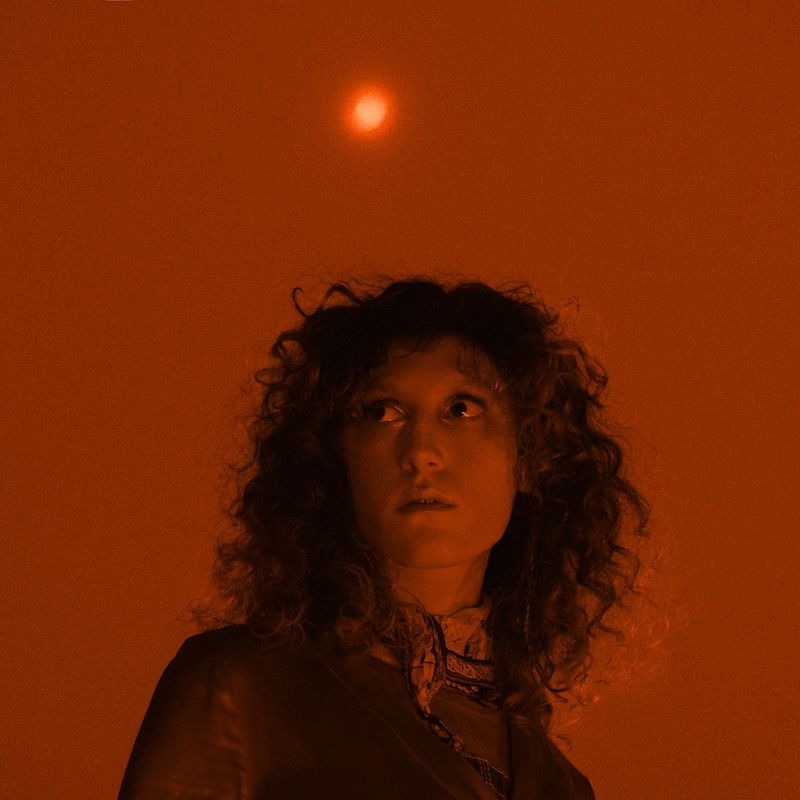
by Bethany Davison
Tracing the chaos both within and beyond the self, Planet (i) sees Ella Williams return to her Squirrel Flower moniker to confront the Anthropocene, and make peace with her fears surrounding the brutal turbulence of the natural world
Where 2020’s I Was Born Swimming saw Williams directed by motion and relationships, Planet (i) takes its central theme from the chaos of nature. ‘I was thinking about the power of storms,’ she tells. ‘It’s always been something I’ve been really afraid of. The power of wind and huge tidal waves, deep water, and fires. All of these things have always deeply scared me.’

‘We have no power against these things,’ she continues. ‘I think a lot of this album talks about weather because it is coming to terms with those fears of mine, and using my fear of the power of nature and the rapidly deteriorating natural world as a metaphor, or a site from which to learn or explore what I’m doing here.’
The most significant embodiment of these fears, or confrontation of these fears, comes in the shape of Big Beast – a superbly cinematic track that suspends Williams up high, placing her voice within the eye of the storm. ‘Storm clouds in my mind / The lightning in my mind’s eye,’ she sings through the song’s climax, fighting against the bellowing darkness of droning guitars. Explaining the reasoning behind this, she says: ‘with Big Beast, I wanted to have this feeling of this biggest storm cloud you’ve ever seen, and try to make that feeling with sound.’ A feeling she has succeeded in, she captures the contrast of light and dark throughout the record. Its penultimate track, Night, grapples with its hazy synth and driving guitar lines, muted down to meet Williams’ vocals, which create a point of calm after a blazen release. Following this is Starshine, a song of love and acceptance, a realisation of a new day at the end of a turbulent path. ‘I wanted it to be this feeling of just intense disaster and doom, really heavy and loud guitar, and then you get through it,’ she states. ‘I guess the way I think of it visually is there is a storm at night, and it clears and there is a sunrise. I feel like that is really corny, but it is also really beautiful.’
Interestingly, the concept for this record only arose when writing the songs. ‘I wrote the first songs for the album in the summer of 2019,’ Williams says. ‘I started it after a specific tour, and, on that tour, I witnessed just so much environmental disaster. And it was really bizarre. For the leg in the midwest, we were basically driving through this field of water because there were such massive floods. It really stuck with me – that image – and it worked its way into the songs.’ Planet (i) marries these striking images of external disaster with Williams’ experiences on an internal level, too. Continuing, she says, ‘at the same time, I was feeling this internal disaster because I was overcoming several concussions that year. It felt like I was deteriorating, my body was deteriorating, the earth was deteriorating. I think a lot of the imagery is about the anthropocene; how the things we are doing are changing the earth.’
Having to overcome a series of concussions lends a crucial context to the record, as it deals with the isolated self, Williams’ conceived place within the vastness of nature and space, in such a way that anticipates many people’s experience of living through the pandemic. Ostensibly not a pandemic record, its encapsulation of tracing the self through a finite setting, of creating a universe while trapped at home, is a notable feat. ‘I was thinking about this the other day,’ Williams adds. ‘Before the pandemic, because of my concussions, I was self-isolated for months. I think two-months was the longest period, and the other ones were a couple of weeks. So when the pandemic started, it kind of felt like I was back in that place. When I was in that place, because of my head injuries, the first bit of it was terrible, but I got into this place where I was really living in my own head, and really witnessing my connection with nature; I couldn’t do anything else other than go for walks in the woods or meditate because you have to get as little stimulation as possible. So I became very peacefully self-sufficient, without technology and without interactions. Of course it came out of necessity, but it ended up being really beautiful creatively for me.’
Writing the record largely before the pandemic, and releasing it now, it could be conceived that its meanings will change on reception, as things always do with any art: meanings changing with the receiver. ‘I think people will probably hear it as a pandemic record because it is so much about disaster, solitude and isolation,’ she says. ‘Which honestly is fine. I made this thing that just pertains to this universal experience that is happening right now. And I think the beautiful thing about music is that people can project their own struggles and joys and experiences onto it – even if it’s not explicitly about that, or intended to be about that. It does feel important that I didn’t write the songs mostly about the pandemic, but in terms of other people perceiving it that way, and it helping them or voicing something that feels pertinent and powerful, I feel fine about that yeah.’
A record driven by conflict and acceptance, its perfect summation is found with Desert Wildflowers. Here, Williams greets her fears, crafting a voice that embraces the wildings of nature. ‘I’m not scared of the storm / I’ll be lying on the roof when the tornado turns,’ she croons, through a stripped back soundscape, no longer any manifestations of nature standing in her way, as she casts herself as a child of the natural world.
If you’d like to support us by subscribing to our zine, click here – it’s just £6 a year for four copies (inc p&p).





